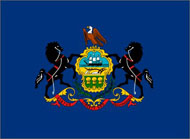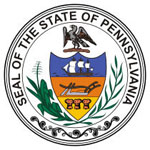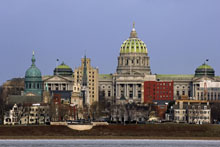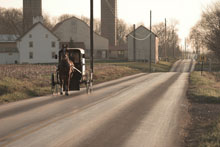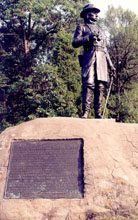About Pennsylvania
Pennsylvania’s nickname, the Keystone State, is quite apt, because the state forms a geographic bridge both between the Northeastern states and the Southern states, and between the Atlantic seaboard and the Midwest. Pennsylvania is bisected diagonally by ridges of the Appalachian Mountains from southwest to northeast
Pennsylvania has one of the largest seaports in the U.S. on its narrow shore, the Port of Philadelphia. In the west the Port of Pittsburgh is also very large and even exceeds Philadelphia in rank by annual tonnage, because of the large volume of bulk coal shipped by barge down the Ohio River. Chester, downstream from Philadelphia, and Erie, the Great Lakes outlet on Lake Erie in the Erie Triangle, are smaller but still important ports.
When first discovered by Europeans, Pennsylvania, like the rest of the continent, was inhabited by groups of American Indians, people of Mongoloid ancestry unaware of European culture. In the early 1600s the English, Dutch, and Swedes disputed the right to the region of Pennsylvania. In 1681, Charles II of England granted a land charter to William Penn for the area that now includes Pennsylvania. Penn then founded a colony there as a place of religious freedom for the Religious Society of Friends (Quakers), and named it for the Latin phrase meaning “Penn’s woods”.
Beginning in the early 1700’s, large numbers of German immigrants began settling throughout Pennsylvania and for many generations, the German language dominated in many rural areas of the state. Individuals claiming German ancestry currently make up a majority of the ethnic composite of Pennsylvania.
Pennsylvania was one of the thirteen colonies that revolted against British rule in the American Revolution of 1776. Pennsylvania became the second state to ratify the U.S. Constitution on December 12, 1787. The Battle of Gettysburg took place in 1863. Many historians consider this battle the major turning point of the Civil War. Dead soldiers from this battle rest at Gettysburg National Cemetery, site of Abraham Lincoln’s Gettysburg Address.
In the latter half of the 19th century, the U.S. oil industry was born in western Pennsylvania, which supplied the vast majority of U.S. kerosene for years thereafter. During the 20th century, Pennsylvania’s existing iron industries expanded into a major center of steel production. Shipbuilding and numerous other forms of manufacturing flourished in the eastern part of the state, and coal mining was also extremely important in many regions.
Pennsylvania’s 2004 total gross state product was $468 billion, this ranks Pennsylvania 6th in the nation. Its agricultural outputs are dairy products, poultry, cattle, nursery stock, mushrooms, hogs, and hay. Its industrial outputs are food processing, chemical products, machinery, and electric equipment. Tourism is a very big industry in the state, ranking as the 7th most visited state in the union, and 7th in tourism expenditures with $15.9 billion.
Pennsylvania has also been called the snack food capital of the world. It leads all other states in the manufacture of pretzels and potato chips. The Sturgis Pretzel House introduced the pretzel to America, and companies like Anderson Bakery Company, Intercourse Pretzel Factory, and Snyder’s of Hanover are leading manufacturers in the state. The three companies that define the U.S. potato chip industry are Utz Quality Foods which started making chips in Hanover, Pennsylvania in 1921, Wise Snack Foods which started making chips in Berwick in 1921, and Lay’s Potato Chips, a Tennessee company. Hershey is known as the chocolate capital of the world.
$state_id = ‘PA’ ;
global $state_id ;
[/insert_php]
[insert_php]
$state_id = ‘PA’ ;
[/insert_php]


